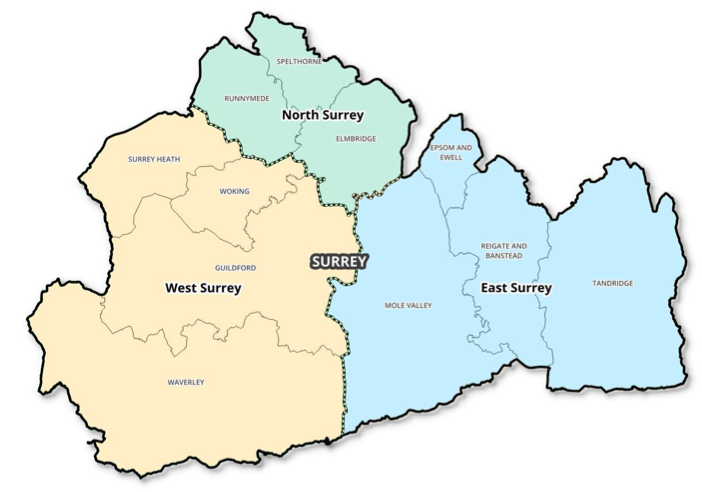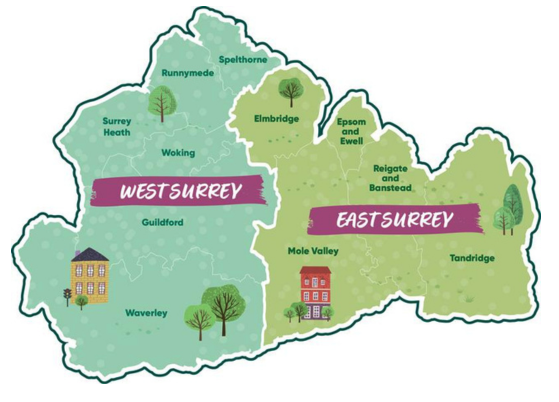

What is LGR?
In December 2024, central government published a paper to set out its approach on devolution – transferring more powers from government to local or regional authorities. They proposed that each area should elect regional Mayors where they don’t currently have them. This approach means that additional power is given to the Mayor, giving them more control over strategic decision making for their area.
To unlock the devolution of further local powers and elect a Mayor, some areas need to reorganise first. This means creating unitary authorities to simplify and streamline local government. Unitary councils are responsible for the services currently delivered by both the county council and local councils. In Surrey, there are eleven district or borough councils, responsible for waste collection, planning, cemeteries, parks and recreation grounds, and Surrey County Council responsible for Children’s Services, Adult Social Care and highways. LGR would mean dissolving all of the existing councils and combining services into unitary authorities. Having fewer councils creates efficiency, clarifies service delivery and saves money. It is, though, debatable whether this is ‘devolution’, which surely entails giving responsibility for democratic decision-making to the most appropriate local level.
The effect of being in the first wave
The Tory-led SCC administration volunteered to be in the first wave of devolution knowing that this would mean the cancellation of the county elections due to be held in May 2025 and extending the term of office of current councillors by two years without a further election. It has also meant that there has been very little time to thoroughly explore all the options for the configuration of the new unitaries, how the debt of councils will be managed and the complexities and costs of organising new teams to handle the key areas of Children’s and Adult Social Services.
Final plans submitted to government
A six week public consultation finished on the 5th August. Congratulations if you waded through the dense, opaque language in the numerous questions better suited to officers working in local government rather than members of the public.
Three unitary proposals
Nine of the eleven local councils are promoting a grouping of current councils into three new unitary authorities. They argue:
Our proposal offers local government that is built around Surrey’s distinct and recognised functional human and economic geographies. By aligning local government with well-defined and understood places, we can create a system that is more responsive, effective and attuned to the diverse needs of the people, communities and businesses that call Surrey home.
Put simply, we believe that local authorities with administrative boundaries that reflect functional and locally recognised areas are better equipped to meet the needs of these areas. They will also improve the potential for partnership working across the system and with community partners.
Two unitary proposals
Surrey County Council, Elmbridge and Mole Valley have promoted a final plan to government splitting Surrey into two councils, East and West. They say:
We’ve analysed a wide range of data on how the two councils would operate and our approach is supported by many of Surrey’s key public sector organisations including health, police, fire, business and community leaders. Existing county council services across Surrey are proven by independent inspectors to be strong, with successful outcomes for residents, and Surrey County Council and many of the district and borough councils have stable finances. This puts us in a good position to see Surrey through reorganisation smoothly.
What next?
The government is now considering the proposals and will make their decision know by the end of September or October. It is rather worrying that in the rush to provide lengthy proposals, key aspects such as how many councillors will represent each ‘division’ (‘wards’ will disappear) have not yet been put forward.


